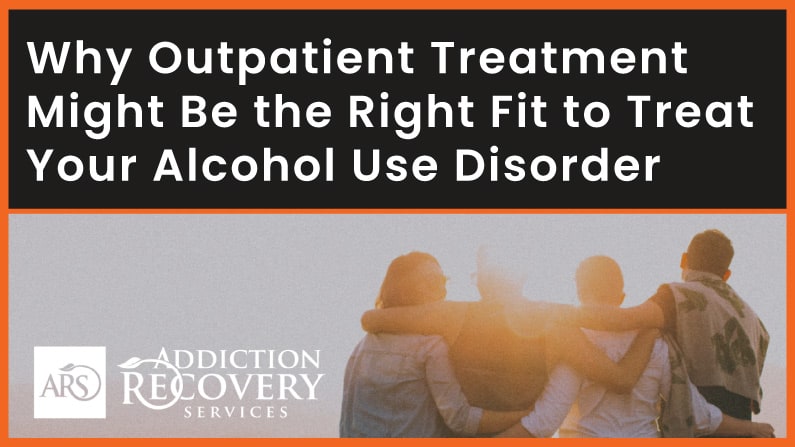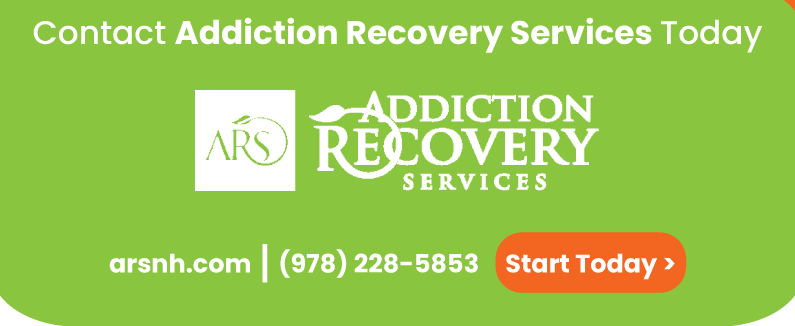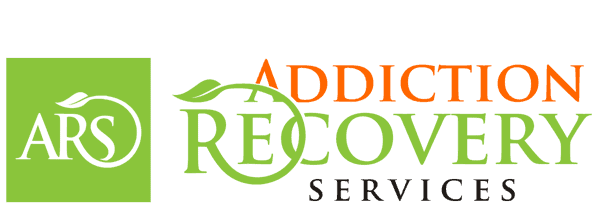
One of the first steps to dealing with your alcohol use disorder, or AUD, is finding treatment that works for you. If you think or know you are struggling with AUD, then doing research like this is a great first step to owning your recovery. You are in the right place.
If this is your first time in the recovery space, everything might feel really big and overwhelming, like you have no idea what to make of all the choices or what will or won’t work for you. If you’ve been through recovery before, you might have been through a treatment program that just wasn’t for you, and maybe you’re ready for something different.
Outpatient treatment for AUD has many benefits. When people think of recovery, they often think of inpatient or residential treatment where they have to temporarily abandon their whole lives just for the chance to heal from their addiction. But that style of treatment doesn’t work for everyone. It isn’t even an option for everyone. Sometimes, you have to balance your real-world responsibilities with your recovery. If that sounds like you, outpatient treatment for AUD might be a good fit for you.
If you or someone you love is struggling with alcohol use disorder, you must know you’re not alone. According to the Substance Abuse and Mental Health Services Administration (SAMHSA), 6.7% of people 12 years of age or older in New Hampshire experienced alcohol dependence or alcohol misuse within a year of the time of their study (2010-2012).
If you or your loved one has a substance use disorder, treatment will teach you the skills you need to recover and take control of your life. Continue reading to see if outpatient treatment is a good fit for you.
What Is Outpatient Treatment?
Table of Contents
Outpatient treatment is just what it sounds like. Many treatment centers offer inpatient or residential services where the client lives on-site at the facility and focuses entirely on their recovery while being fairly isolated from the outside world. However, that is not a good or even realistic option for all people who are suffering from AUD. Many people have family and work responsibilities they can’t step away from but still need a lot of help recovering from their addiction to alcohol. This is where the importance of inpatient vs outpatient treatment comes into play.
Outpatient treatment allows clients to come in during the week on a schedule that works for them. Outpatient treatment programs vary a lot in their requirements. For example, an intensive outpatient program or IOP like the one we offer at Addiction Recovery Services will require you to come in as often as five days a week. However, some lighter programs only have you come in once a week. The type of program that is right for you depends on the severity of your AUD and the flexibility of your schedule.
Outpatient treatment programs at different facilities have different requirements and standards of care. However, most outpatient programs consist of some mix of group therapy and education, individual therapy sessions, and medication for AUD and/or co-occurring (happening at the same time) mental illnesses. Some programs may also include recreational activities and other methods of treatment.
Who Does Well in Outpatient Treatment for AUD?
The key part of being an outpatient is “out.” In an outpatient program, the rehab facility does not provide a place for the client to stay during their recovery. Because of this, it is important that you do have a healthy, stable place to live that is helpful to your recovery.
If you have a home where your family or roommates will be supportive of your recovery and cutting out alcohol, then outpatient treatment might be a good option for you. However, if you are living in an environment where you are going to be encouraged to drink or use other substances, inpatient rehab might be a better option for you.
It is also important to consider the stressors in your life and environment. Even if no one is going to actively encourage you to drink, if you are living in a high-stress environment that is going to push you toward alcohol or other substances, an outpatient program may not provide enough support for you at this stage in recovery.
Outpatient treatment is typically suggested for people who are suffering from less severe AUD. People who are fairly functional and self-motivated will likely do well in outpatient treatment. Outpatient treatment is also a good option for people who have already successfully completed an inpatient or residential program, but who need extra support while continuing with their sobriety journey.

What Are the Benefits of Outpatient Treatment for AUD?
There are several benefits of outpatient treatment for AUD. For one thing, you get to continue living at home. If you have kids who need you to be there or a job you can’t afford to step away from for a 90-day residential stay, that’s OK. Outpatient treatment is something you can work into your daily routine instead of something that requires you to completely rebuild your daily routine.
Outpatient treatment is also typically less expensive than inpatient treatment. This is because outpatient treatment does not require treatment facilities to provide as many additional services as inpatient treatment does, where facilities have to provide things like food, lodging, and laundry for clients.
Outpatient treatment is a simpler option for working people who just need some help recovering from AUD without putting their entire life on hold to do so. You receive many of the same treatment options as inpatient clients do, but you don’t have to put your life on hold to do it.
Who Should Consider Outpatient Treatment for AUD?
There are lots of different people who may find that outpatient treatment is right for them and their families.
Some people who should consider outpatient treatment include:
- People who have already completed inpatient treatment
- People who have a job they cannot leave for a residential program
- People who cannot leave school for a residential program
- People who cannot leave their family for a residential program
- People who may struggle to afford an inpatient facility
- People with a less severe AUD
- People who are not sure how much help they need and want to try something slightly less intensive than inpatient treatment
- People who have a supportive home environment
- People who can stay self-motivated and self-accountable
When Is Medication-Assisted Treatment (MAT) Appropriate to Treat AUD?
Some outpatient treatment centers, including Addiction Recovery Services, offer medication-assisted treatment or MAT. MAT is not right for everyone. But very often, MAT is a very successful and important part of treatment for AUD.
Alcohol is slightly unique from other drugs when it comes to detox. Alcohol is a depressant, and when you get to the point where you become physically dependent on alcohol, your nervous system has adjusted to functioning with that depressant in your system. When you remove that depressant, your nervous system has to readjust how it functions, which can be painful and have serious health consequences.
While detoxing from most drugs is uncomfortable and may cause cravings, detoxing from alcohol can be downright dangerous. Detoxing from alcohol can cause severe headaches, body aches, cramps, and an upset stomach. In extreme cases, alcohol detox can lead to hallucinations (seeing or hearing things that aren’t real) or even seizures, which can be deadly.
In these severe cases, MAT can be extremely useful or even lifesaving. Common medications prescribed in MAT include:
- Naltrexone (Vivitrol and ReVia)
- Acamprosate (Campral)
- Disulfiram (Antabuse)
These medications prevent the severe side effects of alcohol withdrawal. Removing these side effects makes recovery safer for people who have severe side effects and makes it easier to get to treating the root causes of your AUD that much sooner.
Some people in the recovery community discourage the use of MAT because they believe it is simply “replacing one addiction with another,” but this is not true. MAT just gets rid of the harsh side effects of alcohol withdrawal, which makes a client’s recovery safer and faster.
However, if you have more mild symptoms of alcohol withdrawal, you may decide that MAT is not the right fit for you.
Outpatient Treatment at Addiction Recovery Services
If you are looking for alcohol rehab facilities, Addiction Recovery Services might be a good fit for you. Here at Addiction Recovery Services, we offer high-quality AUD treatment. We believe in harm reduction, not perfection or punishment. At ARS, we see you as a unique individual, not just another client. We believe in understanding the ways that your experience is unique to you and what your individual needs are.
Intensive Outpatient Program (IOP)
At ARS, we provide a top-of-the-line intensive outpatient program or IOP.
Our IOP program is made up of:
- Three hours of group therapy and education four days a week
- Five initial weeks of treatment
- Medication-assisted treatment (MAT)
- Weekly consultations with an addiction psychiatrist or psychiatric nurse practitioner
- The ability to extend treatment beyond five weeks as necessary
Our IOP is usually a good option for:
- People returning from an inpatient detox or residential program
- People who wish to continue working and living at home while in treatment
- People who are seeking help for the first time or are uncertain of the amount of help they might need
- People with untreated mental health symptoms contributing to their alcohol use
Find Help Today
If outpatient treatment sounds like a good fit for you or someone in your life, Addiction Recovery Services in Greenland, New Hampshire, is here to help the people of Southern New Hampshire, Southern Maine, and Northern Massachusetts. Telehealth services are available for those who are unable to physically make it to our in-person IOP. If you’re ready to get started, call (978) 228-5853 today.

FAQ:
What is considered outpatient treatment?
Outpatient treatment is a type of treatment where you do not live onsite at the treatment facility. Instead, you live at home and come to the rehab facility regularly to receive treatment.
What is better, outpatient or inpatient?
It’s not that outpatient treatment or inpatient treatment is inherently better. Both types of treatment can be useful. Whether or not a person would do better in outpatient or inpatient care depends on the person’s needs and lifestyle.
What is day treatment like?
At Addiction Recovery Services, treatment usually involves a few hours of daily group therapy, a once-weekly consult with a psychiatrist, and MAT when appropriate.
Is rehab considered outpatient?
Whether or not rehab is considered outpatient usually depends on the level of care a person receives. The defining characteristic that makes a treatment program outpatient or inpatient is whether a person sleeps at home or the treatment facility.
